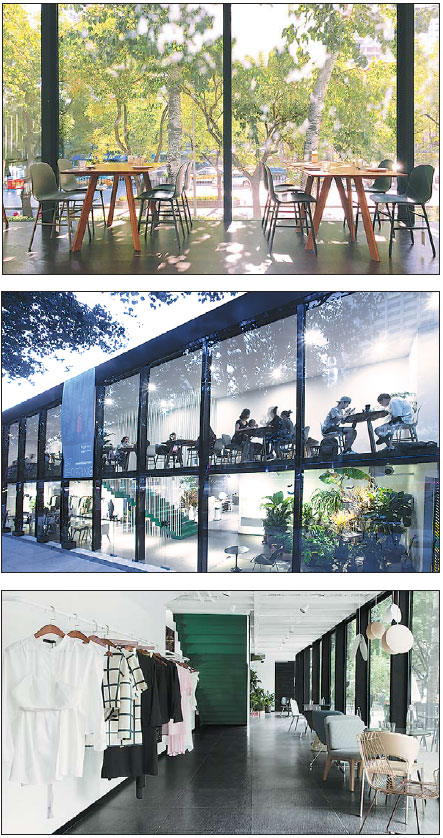Fashionable venue redefines shopping
Feeling a bit hungry? No problem. Just snap up that swish jacket and bonsai plant and head for the dining area at new concept store
It's no use trying to pigeonhole Algorithm as a multibrand fashion boutique or a restaurant or a furniture store.
It's all of the above.
A five-minute walk from the Sanlitun area of Beijing, the store can be found at a bustling intersection. The design is minimalist, with transparent glass walls. The entire store is a giant window on the dining scene and fashion display inside.
|
In Algorithm, a new hotspot in Sanlitun in Beijing, you can buy just about anything, from food to clothing, accessories, furniture and even the bonsai plants in the corridor. One corner in Algorithm displays the latest designer fashion pieces. Photos Provided to China Daily |
In Algorithm you can buy just about anything, from food to clothing, accessories, furniture and even the bonsai plants in the corridor - anything that strikes your fancy.
The menu is updated every season, and every dish is named after a city that has a story to tell. For example, the sandwich is called the Copenhagen, where two of the founders say they first met.
At a time when technology is making almost everything easier, Hu Nan, co-founder of Algorithm, believes that there really is nothing to match a sensory experience. She wants to stimulate everyday life by giving a sense of ceremony to the tiniest things.
"When we really pay attention to the minutiae of life we are happier," she says.
She studied economics at the University of International Business and Economics in Beijing and later became executive chief editor of Fashion China Magazine, where she developed an extensive network in fashion circles. She curated one of the first showrooms for Chinese designers during China Fashion Week and worked as a consultant on strategy and design to many fashion brands.
After working for a few years she went on to acquire a master's degree in business at her alma mater and traveled to Europe during her studies.
There, she was inspired not only by how fashion boutiques are run, but also by the European lifestyle. So she decided to open a store that sells not only clothing but is dedicated to the lifestyle to which she aspires.
Hu imagined the space as a home she would like to live in herself.
"We want to create a sense of cleanliness, quietness and comfort. And we want to attract people who enjoy the aesthetics and lifestyle that we do," she says.
Hu co-founded the store with three friends who worked in media, culinary arts and design. The space was designed by the Kuo space design team. All the walls in the venue - which formerly housed an Iranian restaurant - were removed to create a more open space and allow in the sunlight.
Hu says she selects all the products herself. The store now works with more than 30 designers from China and abroad. There is women's clothing from China, men's clothing from Malaysia, handmade glass from Japan and skin-care products from Germany.
The store also offers made-to-wear service for men and brides.
Hu displays the products by category rather than by designer, sensing this is what most customers want. Good design needs to be complemented with wearability and good quality, she says: "The new designers are really creative, but they need to relate to the customers. Quality and cost are usually a challenge for them."
Now the store has become a venue for fashion events and business salons. Chanel, Oysho, Adidas and Ford are some of the brands that have held events there.



















